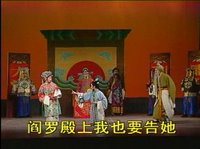 Title: The Mute Lady's Lawsuit (哑女告状)
Title: The Mute Lady's Lawsuit (哑女告状)Genre: Wuxi opera (锡剧)
Format: Stage opera
Production year: Around late 1990s to early 2000s
Director: Chen Jian
Music: Yuan Yao
Scenography: Yang Yuan
Casts: Zhang Meihua as Zhang Shangzhu, Wang Weihong as Zhang Saizhu, Qian Ke as Chen Guangzu, Yang Longhua as Dai Da, Huang Qiuwei as Madam Zhang, Qin Xing as Zhang Zhong
At first glance...
"The Mute Lady's Lawsuit" is a rather famous show in the Chinese opera scene, and so far, Huaiju opera (Jiangsu), Jinju opera (Shanxi), Bangzi opera (Hebei), Huangmei opera (Anhui), Qiongju opera (Hainan), Xiangju opera (Fujian), Chaoju opera and Cantonese opera (Guangdong) had already staged their own version of the same script. Hence, it would be interesting to see how will Wuxi opera, one of the 3 major Chinese opera genres in Eastern China, make this their own traditional show. This show was staged by Suzhou City Wuxi Opera Troupe.
Synopsis
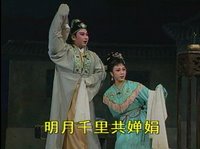 This story took place in Yangzhou during the Ming dynasty. There was a Zhang's Residence whereby one of the towers was rumoured to be "haunted", causing unrest among the household members. The "haunting" was actually fake, and the "ghost" living within was a poor scholar by the name of Chen Guangzu. He was betrothed to Zhang Shangzhu, the eldest daughter of the late Master Zhang. Chen used to come from a reputable family, but ever since his parents' death, his family was reduced to poverty. He tried to take refugee with the Zhang's, but Shangzhu's stepmother looked down on the former, an chased him away. Kind-hearted Shangzhu decided to take him in, but had to hide him inside the tower to avoid suspicion.
This story took place in Yangzhou during the Ming dynasty. There was a Zhang's Residence whereby one of the towers was rumoured to be "haunted", causing unrest among the household members. The "haunting" was actually fake, and the "ghost" living within was a poor scholar by the name of Chen Guangzu. He was betrothed to Zhang Shangzhu, the eldest daughter of the late Master Zhang. Chen used to come from a reputable family, but ever since his parents' death, his family was reduced to poverty. He tried to take refugee with the Zhang's, but Shangzhu's stepmother looked down on the former, an chased him away. Kind-hearted Shangzhu decided to take him in, but had to hide him inside the tower to avoid suspicion.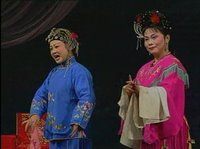 After Guangzu left the Zhang's to pursue his imperial examinations, Madam Zhang tried to force Shangzhu into another marriage. Shangzhu refused and was locked up in the "haunted tower". Not long after, news of Guangzu's promotion as the top scholar reached Madam Zhang and Saizhu's ears. Saizhu, the stepsister of Shangzhu, had always dreamt of becoming a nobleswoman one day, decided to forge her sister's identity and marry Chen. In order to prevent unexpected twist of events in future, Madam Zhang decided to kill Shangzhu by ordering her retarded son Dai Da to burn down the "haunted tower".
After Guangzu left the Zhang's to pursue his imperial examinations, Madam Zhang tried to force Shangzhu into another marriage. Shangzhu refused and was locked up in the "haunted tower". Not long after, news of Guangzu's promotion as the top scholar reached Madam Zhang and Saizhu's ears. Saizhu, the stepsister of Shangzhu, had always dreamt of becoming a nobleswoman one day, decided to forge her sister's identity and marry Chen. In order to prevent unexpected twist of events in future, Madam Zhang decided to kill Shangzhu by ordering her retarded son Dai Da to burn down the "haunted tower".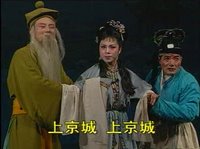 Meanwhile, loyal servant Zhang Zhong had revealed the truth about Saizhu's plot to Shangzhu. Shangzhu was shocked by the deeds of her stepmother and stepsister, and decided to sue them in the imperial city. However, before she could sneak out, the tower burst into flames. Shangzhu escaped from the clutches of Death by jumping off the balcony of the tower, but became crippled. Dai Da realised that he had been tricked into burning down the "haunted tower", and decided to nurse Shangzhu back to health in a secret cave in the garden. With the help of Zhang Zhong, Dai Da piggy-backed Shangzhu all the way to the imperial city to look for Chen.
Meanwhile, loyal servant Zhang Zhong had revealed the truth about Saizhu's plot to Shangzhu. Shangzhu was shocked by the deeds of her stepmother and stepsister, and decided to sue them in the imperial city. However, before she could sneak out, the tower burst into flames. Shangzhu escaped from the clutches of Death by jumping off the balcony of the tower, but became crippled. Dai Da realised that he had been tricked into burning down the "haunted tower", and decided to nurse Shangzhu back to health in a secret cave in the garden. With the help of Zhang Zhong, Dai Da piggy-backed Shangzhu all the way to the imperial city to look for Chen.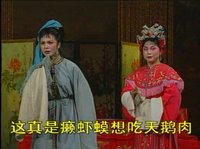 Saizhu got news of their arrival in the imperial city, and hence tricked them back to her residence.In front of her stepsister, Saizhu pretended to be remorseful for her actions, and tried to beg "forgiveness" with a toast of wine. Shangzhu was not in the mood to drink, and Dai Da drank the wine on her behalf. Little did they know that the wine has been drugged, and that Saizhu had actually intended to poison Shangzhu. Dai Da was poisoned to death in the end, and Saizhu muted Shangzhu by stabbing her in the neck repeatedly with a hairpin. She even crushed Shangzhu's fingers so that she could neither talk or write in court.
Saizhu got news of their arrival in the imperial city, and hence tricked them back to her residence.In front of her stepsister, Saizhu pretended to be remorseful for her actions, and tried to beg "forgiveness" with a toast of wine. Shangzhu was not in the mood to drink, and Dai Da drank the wine on her behalf. Little did they know that the wine has been drugged, and that Saizhu had actually intended to poison Shangzhu. Dai Da was poisoned to death in the end, and Saizhu muted Shangzhu by stabbing her in the neck repeatedly with a hairpin. She even crushed Shangzhu's fingers so that she could neither talk or write in court.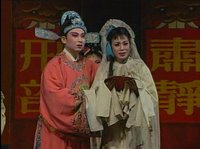 Despite her disabilities, Shangzhu was determined to sue her vicious stepsister. She was finally granted entry to the magistrate's court, and the magistrate was none other than Chen Guangzu. Chen, who had actually not seen Shangzhu's true face previously (they always meet in the dark), was shocked with the close resemblance of Shangzhu to his "wife". At this juncture, Saizhu turned up and accused Shangzhu for being a crasy woman and demanded her to be executed at once. Chen began to doubt the identity of Saizhu, and she was nowhere close to the elegant and gentle Shangzhu he once knew. Loyal servant Zhang Zhong turned up pleading innocence for Shangzhu, and after gathering all her strength, Shangzhu finally managed to speak. She revealed the entire truth to Chen, and the latter was shocked. He then sentenced Madam Zhang to life-imprisonment and Saizhu to be executed immediately.
Despite her disabilities, Shangzhu was determined to sue her vicious stepsister. She was finally granted entry to the magistrate's court, and the magistrate was none other than Chen Guangzu. Chen, who had actually not seen Shangzhu's true face previously (they always meet in the dark), was shocked with the close resemblance of Shangzhu to his "wife". At this juncture, Saizhu turned up and accused Shangzhu for being a crasy woman and demanded her to be executed at once. Chen began to doubt the identity of Saizhu, and she was nowhere close to the elegant and gentle Shangzhu he once knew. Loyal servant Zhang Zhong turned up pleading innocence for Shangzhu, and after gathering all her strength, Shangzhu finally managed to speak. She revealed the entire truth to Chen, and the latter was shocked. He then sentenced Madam Zhang to life-imprisonment and Saizhu to be executed immediately.
Shangzhu was finally reunited with her loved one, but she decided not to don the rainbow robe and phoenix crown which was bestowed to her, as she wished to mourn three years for her poor brother...
Review
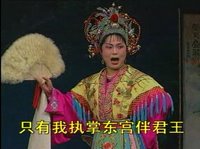 As far as the script is concerned, it lacks originality, as I vaguely remember the Huaiju and Xiangju version of the same show beared the same dialogues and lyrics (but of course with some differences to suit the dialects). Like typical traditional shows, there were obvious flaws in the logic of the show, but were not resolved. Like in scene 2, where Madam Zhang forced Shangzhu to marry a high-ranking official, the script doesn't explain why the former had done that. Normally a stepmother will want the best for their own children first, and a high-ranking official sounds like a good "catch", so why didn't she want to "reserve" the marriage for Saizhu instead? Unless he has got other undesirable traits, then it would be another story, but it wasn't mentioned. And point in the same scene was Saizhu was so decisive im marrying herself to Chen when she heard that Chen had became a top scholar. However, earlier on in the scene, she was dreaming of being the Emperor's concubine, and even become the head of the concubines. The sudden drop of "goal" was too abrupt and awkward.
As far as the script is concerned, it lacks originality, as I vaguely remember the Huaiju and Xiangju version of the same show beared the same dialogues and lyrics (but of course with some differences to suit the dialects). Like typical traditional shows, there were obvious flaws in the logic of the show, but were not resolved. Like in scene 2, where Madam Zhang forced Shangzhu to marry a high-ranking official, the script doesn't explain why the former had done that. Normally a stepmother will want the best for their own children first, and a high-ranking official sounds like a good "catch", so why didn't she want to "reserve" the marriage for Saizhu instead? Unless he has got other undesirable traits, then it would be another story, but it wasn't mentioned. And point in the same scene was Saizhu was so decisive im marrying herself to Chen when she heard that Chen had became a top scholar. However, earlier on in the scene, she was dreaming of being the Emperor's concubine, and even become the head of the concubines. The sudden drop of "goal" was too abrupt and awkward.
The music was another awkward issue. It is very clear that the music were all pre-recorded and then actors sing to that on stage. This was made more obvious by the difference in sound quality of live percussion used in non-singing/ non-music parts of the show.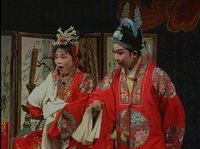 The casting for this show were average. Of all the actors, only Zhang Meihua, who took on the role of Zhang Shangzhu, really caught my attention. She was graceful on stage, looked great, and could sing well. The other actors' singing were not bad too, but did not fare as well in other aspects of their performance. For Qian Ke (Chen Guangzu), he lacked emotions, and his shen duan was average. Wang Weihong's rendition of the vicious Saizhu was good, but she seemed a bit too old to be the younger sister of Shangzhu. In fact, it seemed like none of the actors in this show are young.
The casting for this show were average. Of all the actors, only Zhang Meihua, who took on the role of Zhang Shangzhu, really caught my attention. She was graceful on stage, looked great, and could sing well. The other actors' singing were not bad too, but did not fare as well in other aspects of their performance. For Qian Ke (Chen Guangzu), he lacked emotions, and his shen duan was average. Wang Weihong's rendition of the vicious Saizhu was good, but she seemed a bit too old to be the younger sister of Shangzhu. In fact, it seemed like none of the actors in this show are young.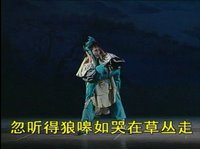 Back to Zhang Meihua, though her performance in general was good, her performance in scene 6 ("Journey to the Imperial City") was disappointing. This is the essence of the show, regardless of the genre, as the actor taking the role of Shangzhu has to perform solo with a "piggy-back doll". This is no easy feat, and the actor will have to act 2 roles simultaneously; a dan from waist up and a chou from waist down. Zhang Meihua's huadan gestures were good, but when it comes to chou movements, it was really average. The quality of this scene was aggravated by the quality of the "piggy-back doll", as the doll was already in a bad-state, and looked more like a zombie, rather than a life-like man.
Back to Zhang Meihua, though her performance in general was good, her performance in scene 6 ("Journey to the Imperial City") was disappointing. This is the essence of the show, regardless of the genre, as the actor taking the role of Shangzhu has to perform solo with a "piggy-back doll". This is no easy feat, and the actor will have to act 2 roles simultaneously; a dan from waist up and a chou from waist down. Zhang Meihua's huadan gestures were good, but when it comes to chou movements, it was really average. The quality of this scene was aggravated by the quality of the "piggy-back doll", as the doll was already in a bad-state, and looked more like a zombie, rather than a life-like man.
On the whole, I feel that this show could have been better executed, but too bad too much of the original script was preserved. It might be good to maintain the traditional aspect of the script, but I think some irrelevant and illogical parts still must be changed. Time has changed, and the audience's level of thoughts has changed as well, so do not expect modern audience to readily accept whatever you throw at them!
Ratings
Script
Music
Scenography
Casts
Final rating

